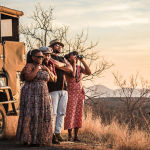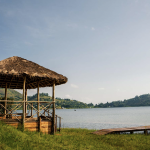Kimberleigh Tommy: Shaping the Future of Palaeontology
Earlier this year Open House by We Are Africa hosted the 2024 tribe at Zeitz MOCAA where Kimberleigh Tommy, a biological anthropologist by training, describes herself as a translator between the worlds of science and society. She is dedicated to bridging the gap between the origin sciences and the public. From 2021 to 2022 Kimberleigh served as Curator of the Maropeng and Sterkfontein Official Visitor Centres in the Cradle of Humankind UNESCO World Heritage Site, where she worked to share the story of humankind’s origins in Africa.
Kimberleigh Tommy’s journey into palaeontology began with a spark of curiosity during her undergraduate studies. Inspired by a short elective course in human evolution and guided by Dr. Job Kibii, a renowned Kenyan palaeoanthropologist, Kimberleigh’s interest in ancient societies found a new direction. Growing up near the Cradle of Humankind, a region rich in fossil heritage, she was encouraged to explore this field further. Her passion for palaeosciences soon blossomed into a career dedicated to both research and making the field accessible to others.
At PAST (The Palaeontological Scientific Trust), Kimberleigh has found a platform where her love for palaeontological research and science communication converge. As a key member of PAST, she is involved in several impactful initiatives. PAST’s mission is to advance the understanding of human evolution through integrated programs in research, education, and public engagement. Kimberleigh plays a crucial role in facilitating these efforts, particularly in supporting African researchers and students through grants and bursaries. She is also at the forefront of PAST’s public understanding program, notably the ‘All From One’ campaign, which promotes the social value of palaeosciences.
One of the most significant moments in Kimberleigh’s career was the discovery of Homo naledi in 2015. As a new postgraduate student, she was thrilled to be part of this groundbreaking find, which underscored the endless possibilities for discovery in palaeoanthropology. Her work on Homo naledi and other species has contributed to a deeper understanding of how these ancient beings lived, enhancing our knowledge of human evolution.
PAST engages the public through various initiatives designed to raise awareness about palaeontology and its importance. The ‘Walking Tall’ educational program, a physical theatre performance, is one such initiative that brings the ancient history of humankind to life. Through movement, it illustrates the development of life and humankind from shared ancestors into the diverse species we see today. This program is particularly aimed at combating discrimination and promoting nature conservation by educating learners and the public about our shared origins.
Kimberleigh’s work at PAST also extends to the tourism industry, where she is exploring collaborations to highlight the rich palaeoheritage of South Africa and the African continent. The goal is to integrate this heritage into the broader narrative of Africa’s cultural and natural history, making it accessible to a wider audience.
In the realm of scientific discovery, PAST has been instrumental in supporting major excavations, such as the unearthing of the ‘Little Foot’ skeleton, attributed to Australopithecus prometheus. This fossil, estimated to be around 3.67 million years old, is one of the oldest hominin fossils discovered in southern Africa. Its excellent preservation provides valuable insights into the morphology, diet, and environment of early hominins, reinforcing southern Africa’s significance in the story of human evolution.
Kimberleigh is particularly excited about the role of technology in advancing palaeontological research. Innovations like CT scanning, synchrotron imaging, and 3D modelling are revolutionising the field, allowing scientists to study fossils in unprecedented detail without causing damage. These technologies are also making palaeontology more accessible, enabling educators and learners to engage with fossil specimens in new and interactive ways.
Despite the advancements, Kimberleigh acknowledges the challenges in the conservation and preservation of fossil sites. A lack of public awareness and inadequate funding are significant hurdles that threaten these invaluable resources. PAST addresses these challenges by engaging in public awareness initiatives and providing financial support for ongoing excavations. Kimberleigh believes that interdisciplinary collaboration is key to overcoming these challenges, citing PAST’s partnership with the Breakthrough Listen Initiative in the study of life on Earth and beyond.
Looking ahead, Kimberleigh hopes to see more research into the origins of life and a deeper exploration of Africa’s fossil heritage. She envisions a future where African scientists play a leading role in shaping the narratives around human evolution and where the knowledge generated by palaeontology is accessible to all.
For aspiring palaeontologists, Kimberleigh’s advice is simple yet profound: hold on to your curiosity. It is this curiosity that drives the field forward, enabling scientists to ask new questions and explore new frontiers. She also emphasises the importance of science communication, urging young scientists to engage with the public and share their work to inspire others.
As Kimberleigh continues to balance her professional responsibilities with personal interests and self-care, she reflects on the achievements she is most proud of, including the ‘Face to Face’ exhibition at Maropeng. This exhibition brought visitors closer to ancient hominins and highlighted the connection between art and science in understanding our past. Her legacy, she hopes, will be one of enabling the growth and success of African scientists in palaeontology, ensuring that they have a meaningful role in telling the story of our origins.
In the future, Kimberleigh aspires to see PAST grow in its impact across the continent, supporting more exploration and research. She envisions a field of palaeontology in Africa that is not only more inclusive but also committed to making the knowledge it generates accessible to all. Through her work at PAST, Kimberleigh Tommy is not only uncovering the mysteries of our past but also paving the way for a more inclusive and accessible future in palaeontology.











